Stories from Greek mythology are fascinating and fun. The myths about gods, heroes, and monsters continue to inspire children today. Whether you are preparing your kids for a trip to Greece, introducing them to world history, or just looking for exciting bedtime stories, mythology offers lessons in courage, kindness, and imagination.
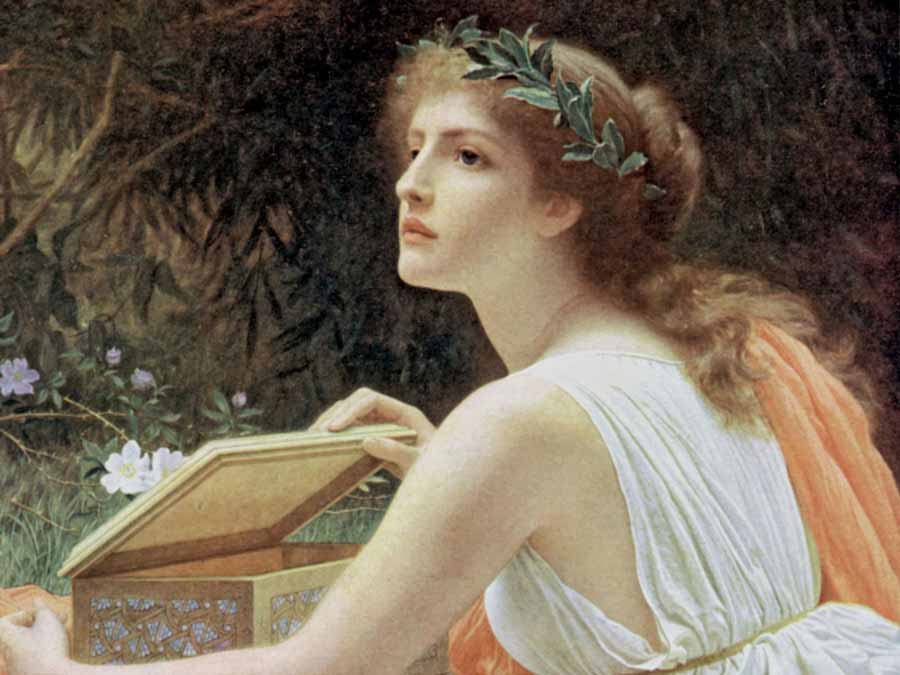
Frequently Asked Questions about Greek Mythology for Kids
1. How do you explain Greek mythology to kids?
Greek mythology is a collection of ancient stories from Greece about gods, goddesses, heroes, and mythical creatures. These myths were used to explain natural events, teach lessons, and share cultural traditions.
There are so many myths that it takes entire volumes of books to cover them all, and many are still famous today — who hasn’t heard of Pandora’s Box or Aphrodite? These tales have inspired artists and writers for centuries, from classical painters to modern authors like J.K. Rowling and Rick Riordan (Harry Potter and Percy Jackson).
Greek mythology even shapes our everyday life. Many children’s names come from these stories, and Greek names remain popular because of their beautiful, timeless sound. It’s a reminder of how mythology continues to influence art, literature, and culture all around us.
2. How did the ancient Greeks use mythology in daily life?
In Ancient Greece, mythology was more than just stories — it was part of daily life and religion. The Greeks built temples for their gods, offered sacrifices, and used myths to explain the creation of the world, natural events, and anything beyond human understanding.
At first, these myths were passed down orally, often through songs, and from the 5th century BC they were written down, especially in plays. Mythology shaped how the ancient Greeks saw their world and their place in it.
3. Who are the main gods and goddesses my child should know?
Some of the most famous ones are: Zeus – king of the gods, god of the sky and thunder. Hera – queen of the gods, goddess of family and marriage. Athena – goddess of wisdom and war. Poseidon – god of the sea. Aphrodite – goddess of love and beauty.
4. Why is Greek mythology still important for children today?
These stories are fun and adventurous, and they also teach values like bravery, cleverness, and teamwork. Mythology is also part of world literature, art, and history, so learning about it gives kids a better understanding of culture.
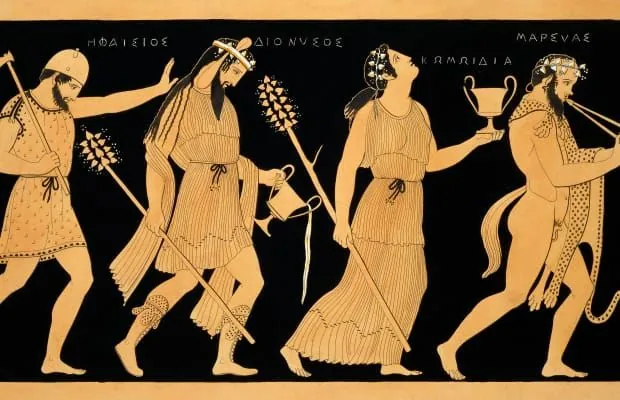
5. What’s a good starting age for Greek mythology books?
Kids as young as 6–7 can enjoy simplified versions or picture books. Older children and teens can explore original or adapted texts with more details.
6. How do I find age-appropriate Greek myths for children?
Some myths include monsters and battles, but many children’s adaptations focus on the adventure and positive messages rather than the frightening parts. Parents can choose age-appropriate versions.
7. What’s the best way to teach kids Greek mythology at home?
– Read children’s books or graphic novels about myths
– Watch age-appropriate movies or cartoons inspired by mythology
– Visit museums or historical sites if traveling to Greece
– Use games, puzzles, or crafts based on gods and heroes
8. What are the best books about Greek mythology for kids?
I’ve created a full list of age-appropriate Greek mythology books with reviews and Amazon links in this article on Greek mythology books for kids. It covers everything from toddler picture books to popular series like Percy Jackson.
In this post, have added an Amazon Best Seller book affiliate links after each Greek Mythology story. Here is a list of Greek Mythology Books for kids according to their ages.
Greek Myths Through My Children’s Eyes
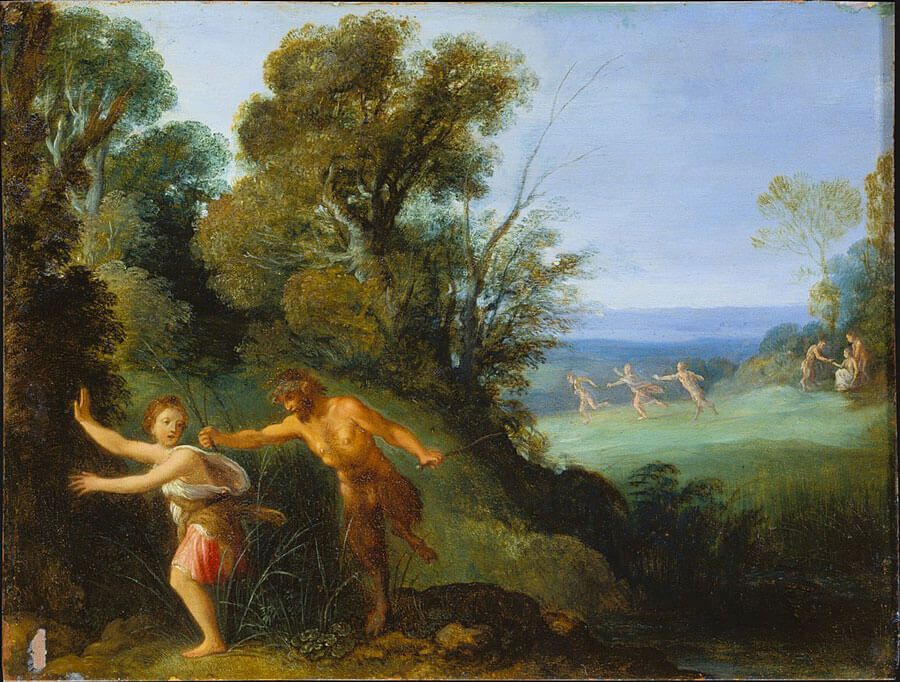
Greek Mythology is entertaining, educative, and fascinating. Because Greek myths are full of adventure, bravery, and clever tricks — and kids often find them irresistible. They consist of magical creatures, jealous gods, and even a robot!
The magical world of the ancient Greek gods was a world full of envious gods, fights and wars, compromise, fear and fun, and punishment and love. The courageous heroes in the epic adventures and myths were based on the fact that heroes and gods, like mortal men, could be punished or rewarded for their actions.
As a mom, I’ve seen how powerful these myths can be for children. Reading them together before our travels to Greece always sparks laughter, big questions, and a sense of wonder — which makes visiting the ancient sites even more magical.
Both my kids love their Greek history classes on mythology — the adventures of gods, goddesses, and heroes always capture their imagination. From what I see in their classrooms, most children get just as excited about these stories. And with the popularity of books, movies, games, and even toys inspired by ancient myths, it’s clear that Greek mythology continues to fascinate kids everywhere.
Read more: What is Greek Mythology? The history of Greek myths explained
Some Greek myths are more beloved than others. Some are in particular interesting for kids. In this post, I have collected 10 stories from Greek Mythology that your kids will love.
10 of the best stories from Greek Mythology
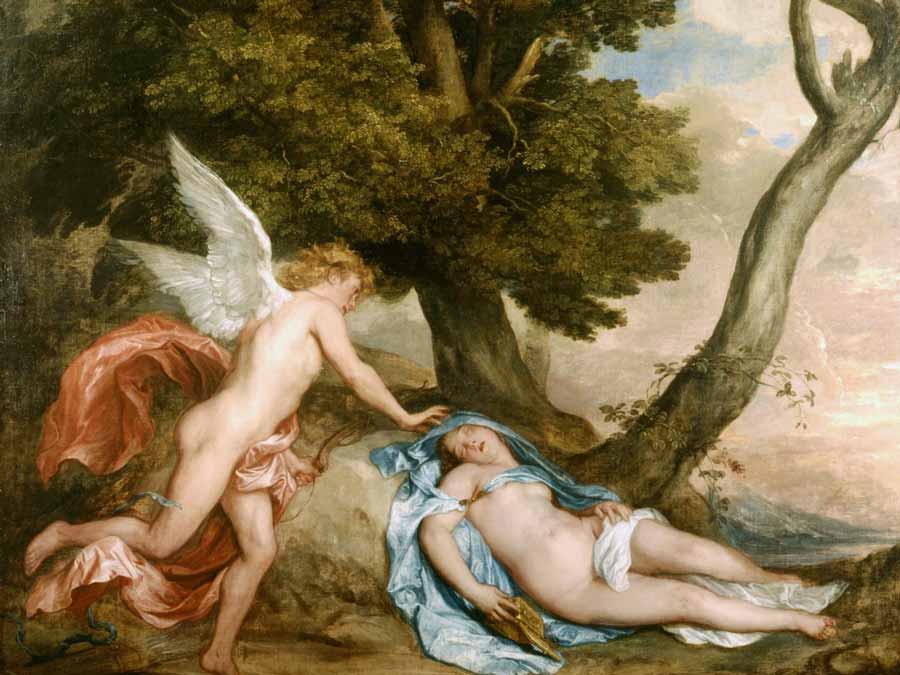
Some stories appeal more to children than others. That is why I made this selection. Below you will find a hand-picked list with a summary of 10 Greek myths that children will.
1 The story about Chaos
Once upon a time…Greek Mythology starts with Chaos. Chaos was, according to Greek myths, the origin of everything. The empty, unfathomable space at the beginning of time. Chaos is the state the universe was in before it was created. Chaos is often identified as a god, who filled the gap between Heaven and Earth.
Born out of chaos were the first beings: Gaia, Mother Earth, Tartarus, the Underworld, Uranus, the Sky, Nyx, the Night, and Erebos, the Darkness of the Underworld. You can read more about Chaos in the book Greek Mythology for Kids: Tales of Gods (Zeus, Titans, Prometheus, Olympians, Athena, Mankind, Pandora) by Charlie Keith, Kindle for ages 7-12.
2 The story of the Titans
The Titans came next. They were the Greek gods that ruled the world before the Olympians (also called the first gods or elder gods). The first twelve Titans were the children of the original gods Uranus (Father Sky) and Gaia (Mother Earth). Some of the children of the Titans are also famous gods in Greek mythology.
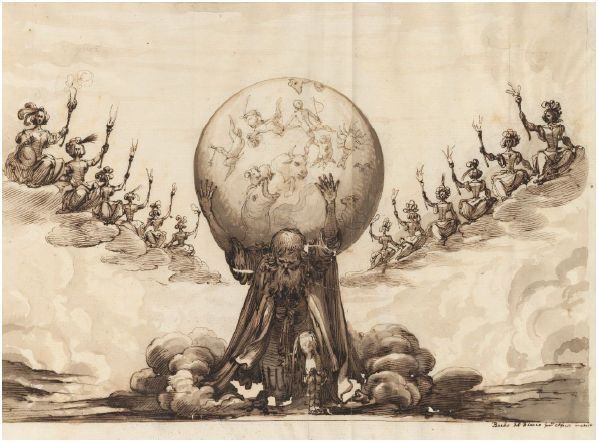
Cronos was the King of the Titans. But a prophecy said that his sons would one day overthrow him. In order to protect himself, each time his wife Rhea had a child he would swallow it. This worked until Rhea, unhappy at the loss of her children, tricked Cronus into swallowing a rock, instead of her baby (Zeus) who she hid away in a cave. Zeus survived and became a very important figure in Greek Mythology.
Once Zeus was born, his father was forced to spit up his siblings. Once grown, Zeus managed to free his siblings, and with the help of their gigantic half-siblings, the three Cyclopes and three fifty-headed monsters, the Olympians triumphed over the Titans. They ruled over the affairs of mankind from their palace atop Mount Olympus.
Atlas is also a famous Titan. After losing the war against Zeus, Atlas was punished and he had to hold up the heavens on his shoulders. We often show Atlas holding the Earth.
What happened in the Titanomachy?
The Titanomachy is a ten-year series of battles fought in Thessaly, consisting of most of the Titans (Mount Othrys) fighting against the Olympians (Mount Olympus) and their allies. The war was fought to decide which generation of gods would have domain over the Cosmos; it ended in victory for the Olympians.
In The Battle of the Giants (Zeus, Titans, Prometheus, Atlas, Olympians) by Charlie Keith, kids from 9 to 12 years old will find everything they need to know about the Titan struggles.
3 Stories of the Twelve Olympian Gods
Most stories from Greek Mythology are about the Olympian Gods. These twelve famous gods and goddesses ruled the universe from Greece’s Mount Olympus. They had come to power after their leader, Zeus, overthrew his father, Cronos, leader of the Titans. All the Olympians are related to one another. The Romans adopted most of these Greek gods and goddesses but with new names. Do you know the Greek Olympian God’s names?
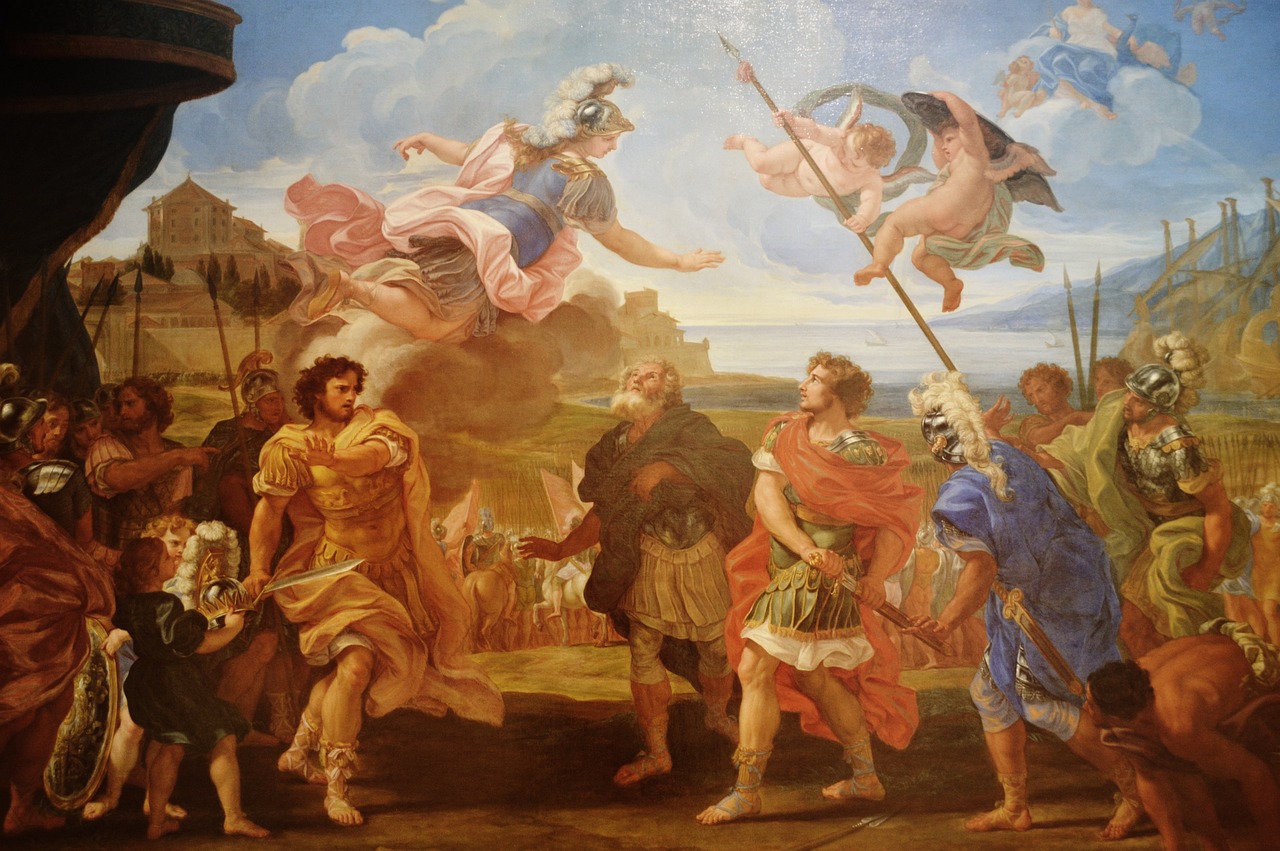
The 12 Olympian Gods
- Zeus was the God of the sky and lightning and the most important of all gods.
- Poseidon was the feared God of the sea. He is the brother of Zeus.
- Athena is the daughter of Zeus. A brave and wise goddess. She is the city protectress, goddess of war, handicraft, and practical reason.
- Aphrodite was the goddess of love, and she liked doves, sparrows, and swans.
- Hades is the King of the Underworld.
- Hera was the queen of the gods and the protector of women and marriage.
- Hestia was the oldest of the gods of Olympus. She is the goddess of the hearth, the right ordering of domesticity, the family, and the home.
- Hephaestus was the god of fire. He was a blacksmith whose forge was in a volcano.
- Ares was the god of war.
- Hermes was the messenger god. He was young and intelligent-looking. He wore a winged hat and winged sandals, and he carried a magic wand.
- Apollo was the god of wisdom, poetry, and music.
- Demeter was the goddess of the harvest, fertility, agriculture, and nature.
Was there a 13th Olympian god?
Yes, there was! Her name is Artemis. Apollo’s twin sister, Artemis, was the goddess of wildlife and hunting. She was also a helper of midwives as a goddess of birth.
Books about the 12 Olympian Gods
There are numerous good story books about the 12 Olympian Gods. One of the best and most complete is the National Geographic Treasury of Greek Mythology: Classic Stories of Gods, Goddesses, Heroes & Monsters. This Greek Mythology encyclopedia is suitable for children from 7 to 11 years old and contains most of the stories listed in this post.
For older children, I recommend the Olympian Series by George O’Connor. In 12 volumes, kids from 9 until 12 years old will meet their favorite god through appealing comics. This Amazon 5-star series also includes a family tree included. For teens, the Olympus Academy: The Complete Collection (12 – 18 years) is the series that you should be in your library.

4 The story of Goddess Athena
My kid’s favorite Olympian is the goddess Athena. Her birth seems especially fascinating to my kids. Zeus, the father of gods and goddesses, was Athena’s father. Her mother was Metis, a mortal woman. Older gods had warned Zeus that he would be in trouble if Metis gave birth to a daughter. So he swallowed Metis whole.
When it came time for Athena to be born, she sprang full-grown out of Zeus’s head. She was completely dressed in armor, as she always would be. She also carried a shield and a spear. Athena turned out to be a great warrior.
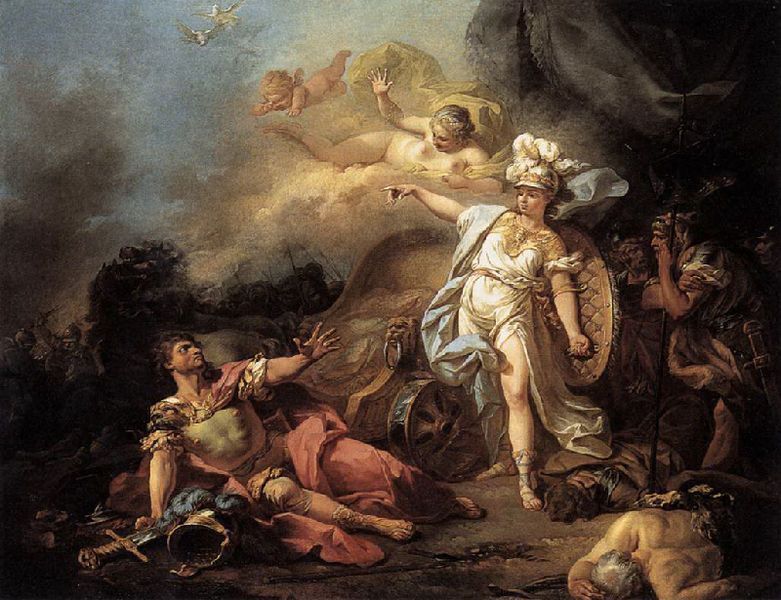
Athene and Poseidon
Athena didn’t get along with the sea god Poseidon. They were always rivaling over one thing or another. So when the people of a new city were looking for a god to watch over and protect them, Athena and Poseidon both wanted the job. To impress the city’s citizens, the two gods gave them gifts. Poseidon struck the ground with his three-pointed spear, and water poured out.
The water turned into a river that flowed into the sea. Poseidon told the people to build ships to sail to the sea. He said that they could travel everywhere. They could become the most powerful people on earth. The citizens were indeed impressed. But then Athena told them to taste the water. It tasted awful. It was salt water, which is impossible to drink.
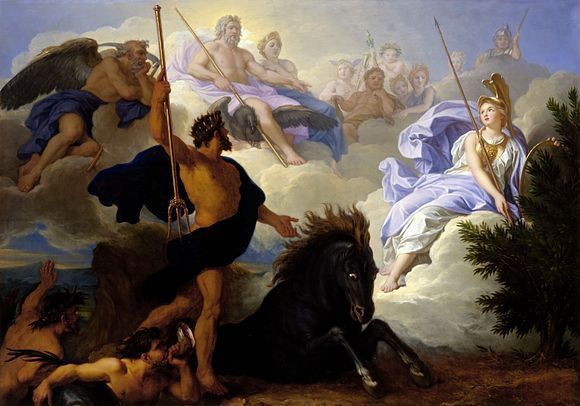
The city of Athens
Then Athena gave the citizens her gift. When she hit the ground with her spear, a tree magically grew up within seconds. She explained that it was a special tree—an olive tree. Its wood was good both for building houses and for heating those houses in winter. Better still, the tree’s little green fruits, called “olives,” were delicious. And oil made out of the olives was useful for cooking. The citizens liked Athena’s gift better than Poseidon’s. Not only did they choose Athena to watch over them, they named the city after her.
Naming the city of Athens
They called it Athens. Poseidon left in a huff, causing a serious flood on his way. But the Athenians weren’t bothered very much. With Athena’s help, their city grew to be strong and wealthy. Athens became one of the greatest cities of all time. Today it’s the capital and the largest city of Greece.
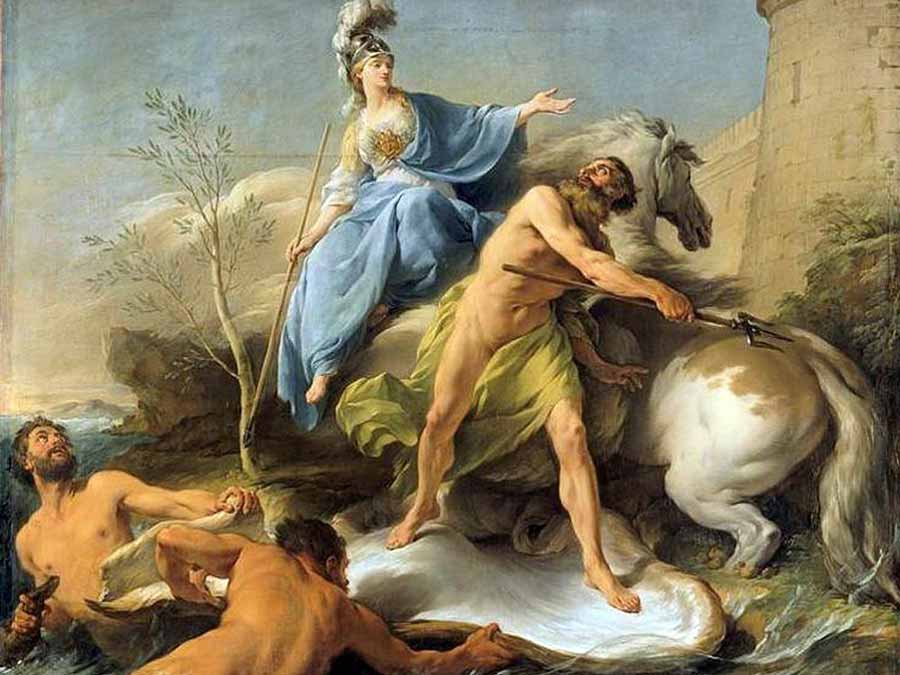
Being of the most famous goddess of all, the list of books about Athena is long. If I have to pick one volume that covers Athena and a lot more famous stories from Greek Mythology, it would be the classic collection D’Aulaires Book of Greek Myths for Children from 6 to 11.
5 The story of the 12 Labors of Heracles
Besides many gods, stories from Greek Mythology also represent countless demigods. The most famous is Heracles. Many popular stories were told of his life, the most famous being The Twelve Labours of Heracles. Each of these elaborate 12 labors stories are favorite tale amongst many kids.
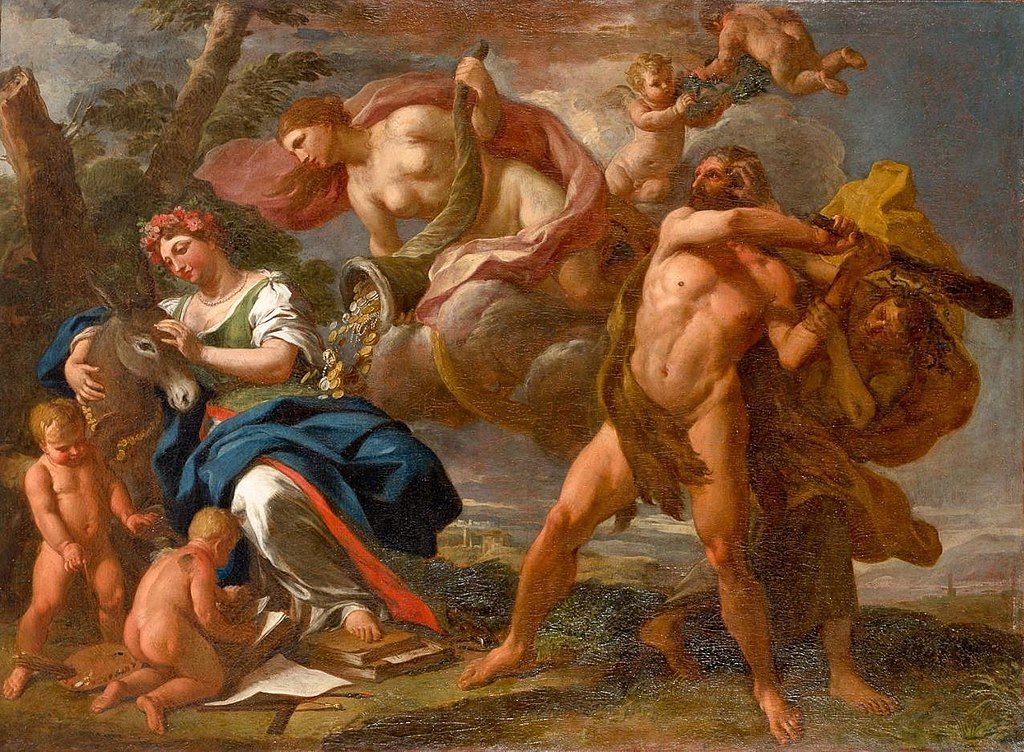
Who is Heracles?
This Greek hero is incredibly strong, courageous, and intelligent. His father was Zeus, king of the gods, and his mother was Alcmene, a beautiful human princess. Even as a baby, Heracles was very strong. When the goddess Hera, Zeus’ wife, found out about the strong baby, she wanted to kill him. In order to do that, she snuck two large snakes into his crib.
However, baby Heracles grabbed the snakes by the neck and strangled them with his bare hands. Heracles mother tried to raise him as a regular child. He attended a normal school with mortal children. But one day, he got mad and hit his music teacher with his lyre and killed him by accident.
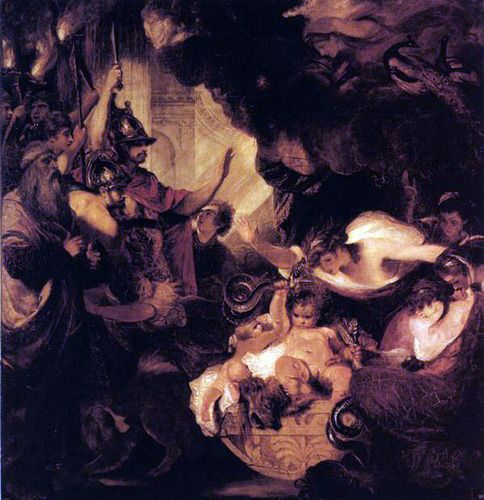
What did Hera do to Hercules?
Later on in life, Heracles married Megara, and he had a happy family life. This angered Hera once more. She tricked Hercules into thinking his family was a bunch of snakes. Heracles killed his children and Megara. After his madness had been cured, Heracles realized what he had done and fled to the Oracle of Delphi. Unbeknownst to him, the Oracle was guided by Hera. He was directed to serve King Eurystheus for ten years and perform any task Eurystheus required of him. The tasks the king gave him are called the Twelve Labors of Heracles.
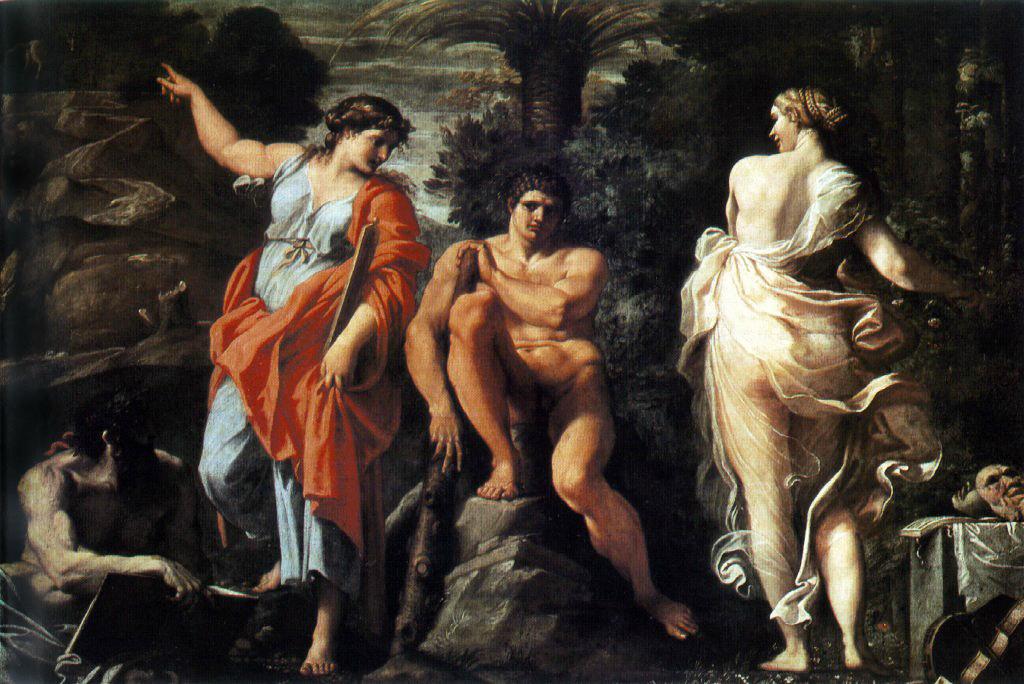
What are the 12 labors of Hercules?
The famous 12 Labors of Heracles refer to the tasks that King Eurystheus ordered Heracles to do. Let’s take a look at them below. Hercules would not be a legend if he had not managed to complete all these twelve labors and free himself from the service of the king.
- slay the Nemean Lion
- slay the nine-headed Lernaean Hydra
- capture the Golden Hind of Artemis
- capture the Erymanthian Boar
- clean the Augean stables in a single day
- slay the Stymphalian Birds
- capture the Cretan Bull
- steal the Mares of Diomedes
- obtain the girdle of Hippolyta, Queen of the Amazons
- obtain the cattle of the monster Geryon
- steal the golden apples of the Hesperides
- capture and bring back Cerberus, the three-headed dog of Hades
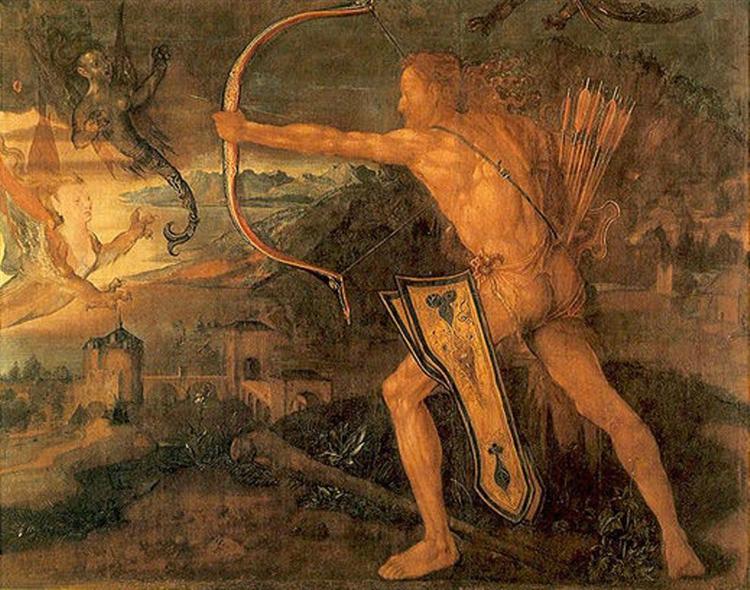
My kids’ favorite Heracles stories from Greek Mythology? The two below made it to the top ten!
What is the Nemean Lion?
The slay the Nemean Lion is the first of Heracles’ 12 tasks. The Nemean Lion had huge teeth, and skin so tough that it could not be pierced by arrows. Everyone in the land of Nemea was very scared of it and many hunters had tried to kill the beast, but none had succeeded. When Hercules got to Nemea and began tracking the terrible lion, he soon discovered his arrows were useless against the beast.
Hercules picked up his club and went after the lion. Following it to a cave that had two entrances, Hercules blocked one of the doorways, then approached the fierce lion through the other. Grasping the lion in his strong arms, and ignoring its powerful claws, he choked the lion to death.
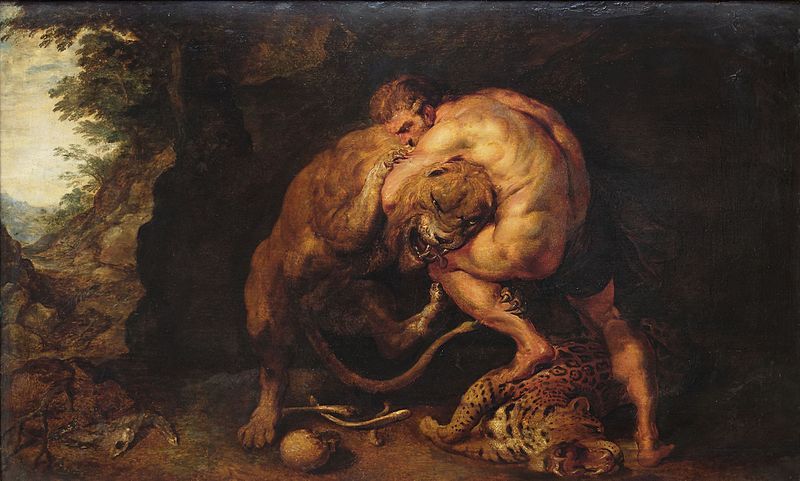
The Lernaean Hydra
The slaying of the nine-headed Lernaean Hydra is another favorite tale. In this story, our hero deals with one fire-breathing monster with multiple serpent heads that when one head was cut off, two would grow in its place. The Lernaean Hydra lived in a swamp near Lerna.
Hera had sent it in the hope it would destroy Heracles’ home city because she thought it was invincible. But with the help of his nephew Iolaus, he defeated the ugly monster and dipped his arrows in its poisoned blood, thus envenoming them.
The most complete book about Heracles for children from Kindergarten until 12 years old is the best-selling Who was Hercules? Greek Mythology for Kids by Baby Professor Children’s Greek & Roman Books
As you can see, there are so many stories from Greek Mythology about the personality of Hercules, he is one of the most famous!
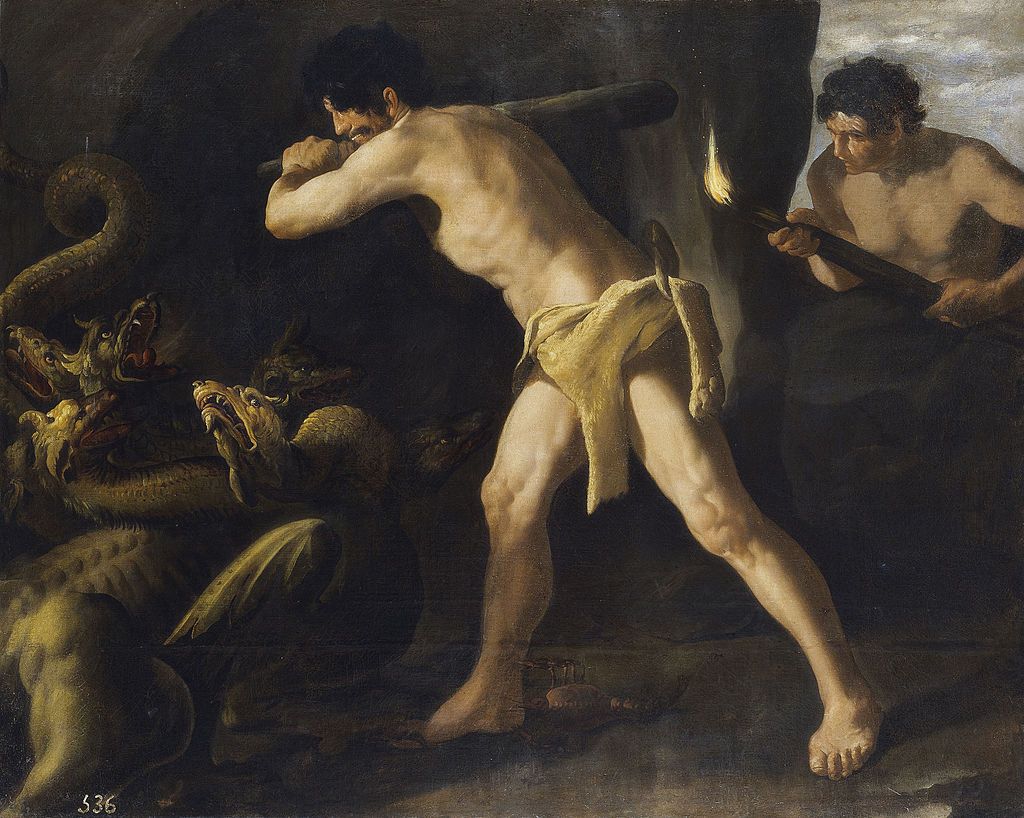
6 The story of Perseus and the Gorgon Medusa
If your kids like monsters, they will also enjoy the famous tale about the terrifying Gorgon Medusa and the great hero Perseus. Demigod Perseus was the son of Olympian god Zeus and the mortal woman Danae. Perseus sought to kill Medusa, the only mortal of the three monstrous sisters.

Instead of hair, Medusa had living venomous snakes on her head and anyone that would look at her eyes would immediately turn into stone. With the help and the wisdom of goddess Athena, Perseus approached the monster by looking through the reflection of a shield and cutting off her head.
Early Myths Perseus explores the story of Perseus. The book won a prize at the Moonbeam Children’s Awards and is a must-have introduction for anyone starting to read stories from Greek Mythology with their kids (Best for ages: 4 – 10)
7 The story of Theseus and the Minotaur
The most famous labyrinth is found in Greek mythology in the story of Theseus, prince of Athens. This labyrinth was designed by Daedalus for King Minos of Knossos on Crete to contain the ferocious half man – half bull known as the Minotaur.
The myth of Theseus and the Minotaur is one of the most tragic and fascinating stories of Greek Mythology. Theseus, a genuine Greek hero, and Minotaur, one of the most devastating and terrifying monsters are the protagonists of a story connecting the two of the main city-states in the Hellenic world: Athens and Crete.
What is the story of the Minotaur?
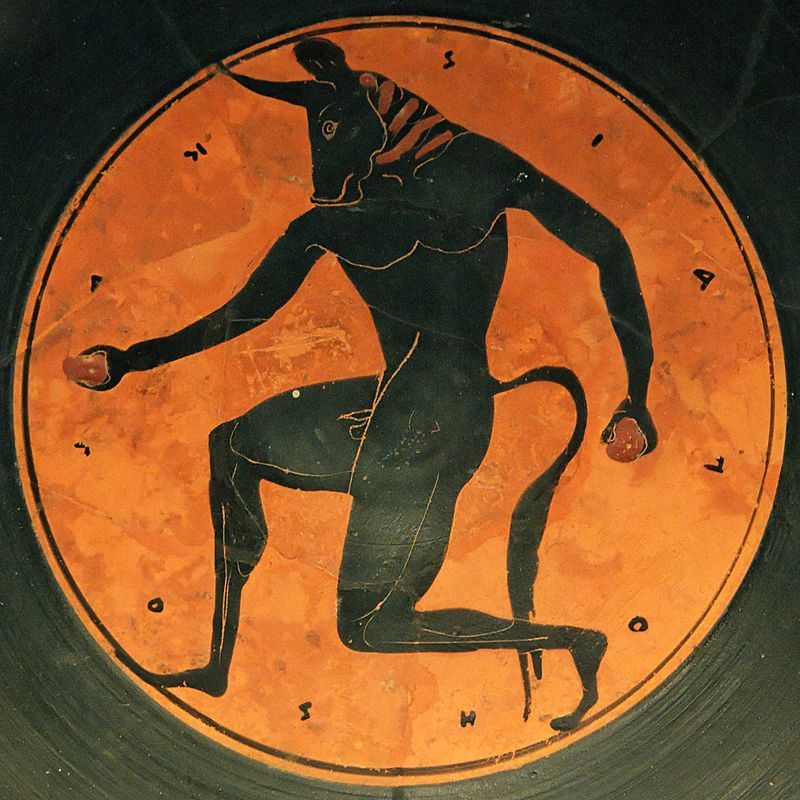
The Minotaur was the son of Pasiphae, wife of King Minos of Crete. Queen Pasiphae slept with a bull sent by Zeus and gave birth to Minotaur, a creature half man – half bull. King Minos was embarrassed but did not want to kill the Minotaur, so he hid the monster in the Labyrinth at the Minoan Palace of Knossos. Minos was imprisoning his enemies in the Labyrinth so that the Minotaur could eat them. The labyrinth was such a complicated construction that no one could ever find the way out alive.
Son of Minos, Androgeus, went to Athens to participate in the Panathenaic Games, but he was killed during the Marathon by the bull that impregnated his mother Pasiphae. Minos was infuriated, and demanded Aegeus, the king of Athens, to send seven men and women every year to the Minotaur to avert the plague caused by the death of Androgeus.
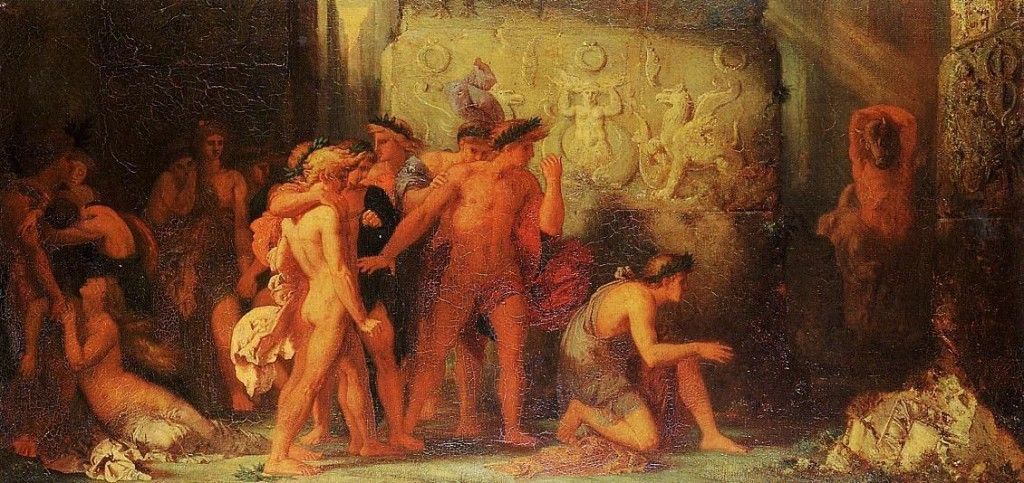
Theseus and the Minotaur
In the third year, Theseus, son of Aegeus decided to be one of the seven young men that would go to Crete, in order to kill the Minotaur and end the human sacrifices to the monster. King Aegeus tried to make him change his mind, but Theseus was determined to slay the Minotaur. He promised his father that he would put up white sails coming back from Crete, allowing him to know in advance that he was coming back alive.
The boat would return with the black sails if Theseus was killed. Theseus announced to King Minos that he was going to kill the Monster, but Minos knew that even if he did manage to kill the Minotaur, Theseus would never be able to exit the Labyrinth. In the stories from Greek Mytholgy, the Minotaur is probably the most famous beast!
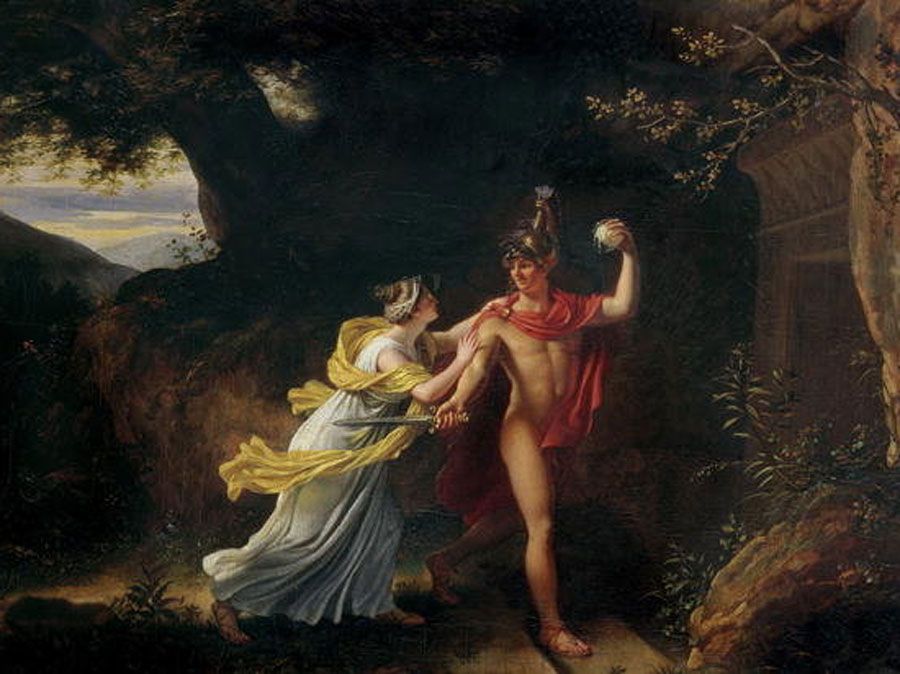
Ariadne’s Thread
However, Theseus met Princess Ariadne, daughter of King Minos, who fell in love with him and decided to help Theseus. She gave him a thread (known in Greek Mythology stories as Ariadne’s Thread) and told him to unravel it as he would penetrate deeper and deeper into the Labyrinth so that he knows the way out when he kills the monster. Theseus followed her suggestion and entered the labyrinth with the thread. He managed to kill the Minotaur and save the Athenians, and with Ariadne’s thread, he managed to retrace his way out. With Ariadne on his boat, Theseus left Crete sailing happily back to Athens.
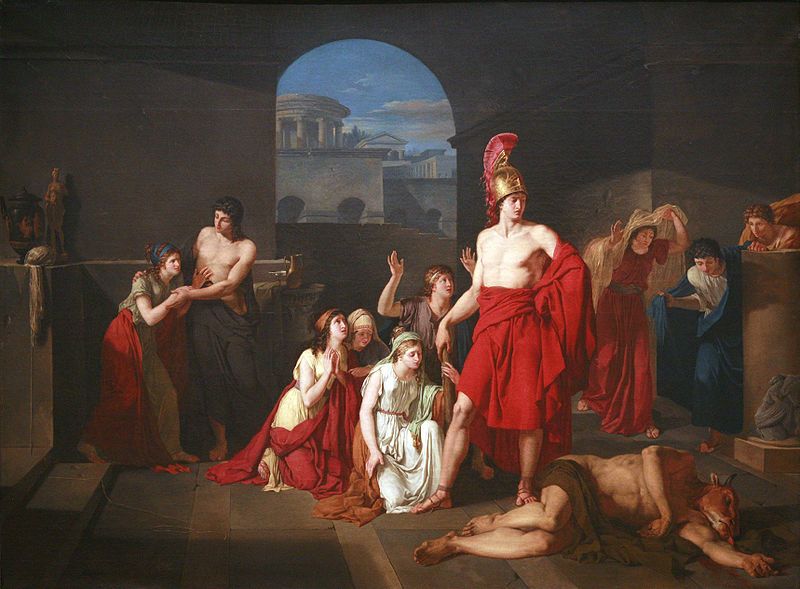
Stories from Greek Mythology: Aegeus and the Sails
Theseus’ boat stopped at Naxos and the Athenians had a long celebration dedicated to Theseus and Ariadne. After many hours of feasting and drinking, Ariadne fell asleep on the shore and didn’t enter the boat that sailed to Athens. Theseus figured out that Ariadne was not with them when it was too late, and he was so upset that he forgot the promise made to his father and did not change the sails.
King Aegeus and the Aegean Sea
King Aegeus was waiting at Cape Sounion to see the sails of the boat. He saw the black sails from afar and presumed his son was dead. He dropped himself into the waters, committing suicide and since then, this sea is called the Aegean Sea.
For the adventures of Theseus, I recommend you to look at Theseus: Book 6- Early Myths Kids Books on Greek Myth (Volume 6) for 4 – 10 years old.
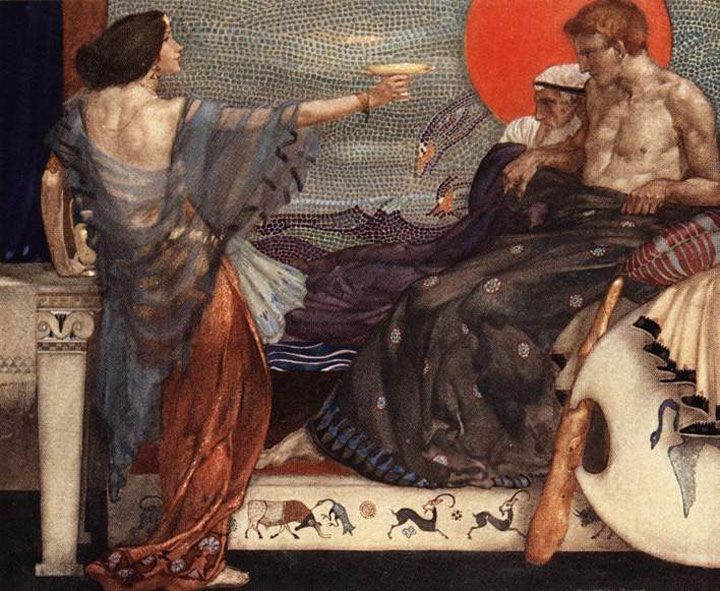
8 The Story of the Apple of Discord
My daughter loves the Apple of Discord, in some ways resembling the symbolism of a familiar fairy tale. The protagonist in this story is Eris. During the wedding of Thetis and Peleus, the goddess of discord, Eris, was not invited. Infuriated by this, she tossed a solid gold apple into the wedding. It had inscribed on it “to the fairest”.
All the gods recoiled and most goddesses, but Athena, Aphrodite, and Hera fought over the title. They asked Zeus whom it belonged to, and he responded to ask Paris, a mortal prince. They showed him the apple, and asked the question, bribing him with gifts. He chose Aphrodite and would cause a war between the gods and mortals.
The protagonists of the Apple of Discord can all be found in Greek Mythology: The Gods, Goddesses, and Heroes Handbook: From Aphrodite to Zeus, a Profile of Who’s Who in Greek Mythology.
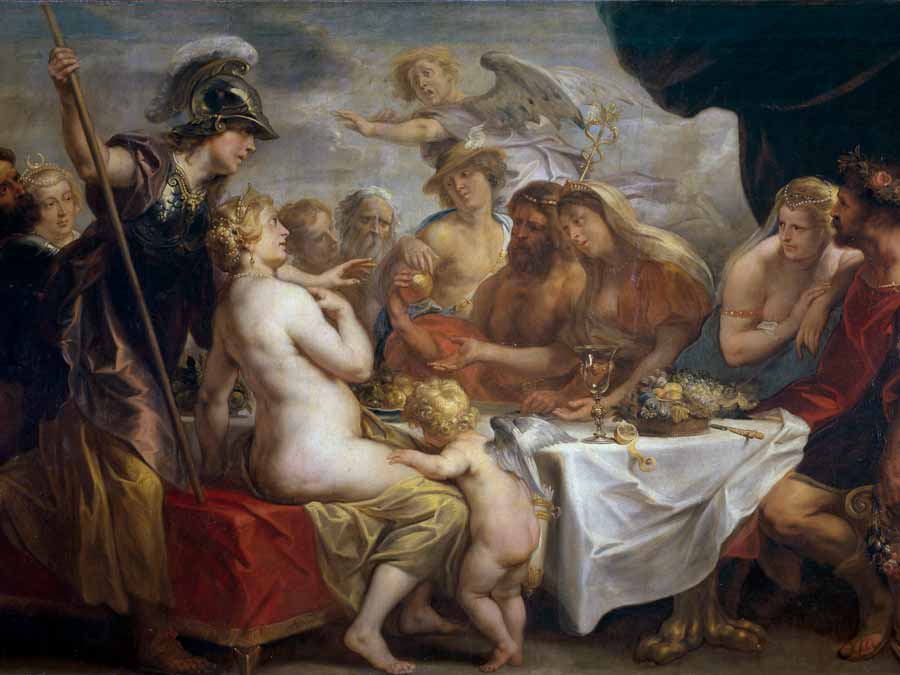
9 The story of Jason and the Argonauts
One of the most exciting stories of Greek Mythology is that of Jason and the Argonauts, and their quest for the Golden Fleece. In Greek mythology, Jason was the leader of a band of 50 adventurers who set out on a long journey to find the Golden Fleece.
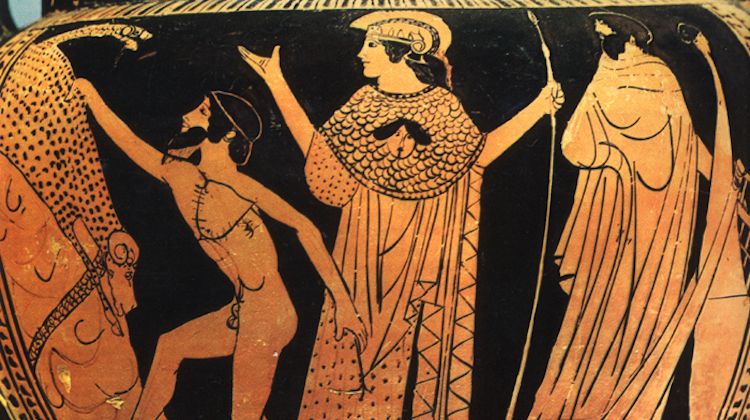
Jason and his adventurers traveled in the ship named Argo to fetch the Golden Fleece, the golden wool of a ram. Jason’s father, Aeson, was the rightful king of Iolcos in Thessaly, in what is now northern Greece. However, Jason’s uncle Pelias seized the throne. Pelias promised to step down and let Jason be king if Jason would get the Golden Fleece —an impossible task, it seemed. After setting off, the Argonauts had many experiences.
Although Jason succeeded in the quest, he never achieved his true goal—to become king of the land of Iolcus.
Stories from Greek Mythology: The Golden Fleece
The Golden Fleece is one of the most important elements in the Greek myth of Jason. It was kept in a grove sacred to the god Ares in distant Colchis, a land of fabulous wealth at the eastern end of the Black Sea. A dragon who never slept guarded the fleece. The golden wool came from the ram Aries, who had been sacrificed to Zeus and then placed in the heavens as a constellation.

The Centaur Chiron
Kids love the magical creatures in the adventures of Jason and the Argonauts. One of them is the centaur Chiron. Centaurs were mythical creatures with the upper body of a human and the lower body of a horse. When Jason was still a boy, his mother feared for his safety. She sent him away to be guarded by Chiron, a wise centaur who took charge of the boy’s education.
What is special about the Chiron
Chiron taught Jason hunting and warfare, music, and medicine. Some accounts say that the centaur also gave Jason his name, which means “healer,” in recognition of the boy’s skill in the medical arts. In Greek mythology, Chiron was held to be the superlative centaur amongst his brethren since he was considered the wisest and justest of all the centaurs.
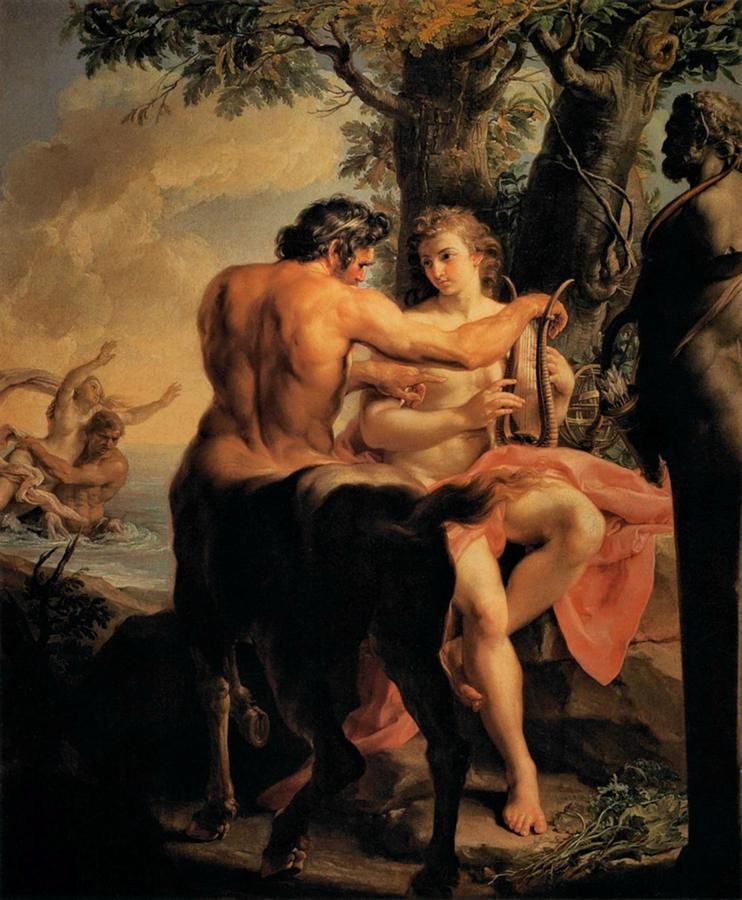
Medea in stories from Greek Mythology
In stories from Greek mythology, Medea is an enchantress or a sorceress who helped Jason, obtain the Golden Fleece. She is often depicted as a priestess or a witch. Medea was of divine descent and had the gift of prophecy. She married Jason and used her magic powers and advice to help him.
Early Myths is a very successful series of Greek Mythology books about Greek heroes including Jason & the Golden Fleece. These multimedia books are available on the iPad, iPhone, and Kindle, and there are audiobooks and paperbacks. A must-have introduction for anyone starting Greek Mythology with kids aged 4 to 10. Older children will enjoy Jason, the Argonauts, and the Golden Fleece: An Interactive Mythological Adventure.
10 The story of the Talos
A personal favorite is the story of the Talos. The Talos, also spelled Talus or Talon, was a giant automaton made of bronze built by Hephaestus, the Greek god of invention and blacksmithing. Endowed with superhuman strength, and powered by ichor, the life fluid of the gods, this automaton was unlike anything Hephaestus had made before. The god named his creation Talos: the first robot.
Talos was commissioned by Zeus, the king of gods, to protect the island of Crete from invaders. He marched around the island three times every day and hurled boulders at approaching enemy ships. Talos’ only weakness was his ankle (the same way Achilles was), where the single vein containing all of his life-fluid (ichor, the blood of the gods) was sealed with a thin membrane of the skin or a bronze nail.
Medea and the Death of Talos
As Jason and the Argonauts approached the shores of Crete, Talos noticed their ship and tried warding it off in his usual, ever-effective manner. And who knows – he might have been successful yet again, had Medea not traveled on the Argo as well.
Fearless, she mounted on the deck of the ship, and after invoking the Death spirits (the Keres) several times, she bewitched the eyes of Talos. Because of this, the bronze man was unable to see a sharp crag in front of him. As a result, he subsequently, grazed his ankle. The ichor gushed forth like melted lead, and Talos fell to the ground defeated.
Stories from Greek Mythology have a timeless power to spark children’s imaginations — whether through school lessons, bedtime stories, or a family trip to Greece. These myths are more than just tales of gods and heroes; they carry lessons about bravery, cleverness, and the mysteries of the world that still speak to us today.
If your kids are curious to explore further stories from Greek Mythology, check out my full guide to the best Greek mythology books for children, or share some of the classic stories listed above together. And if you’re planning a family trip to Greece, don’t miss my tips for visiting Athens with kids — where history and mythology come alive.
Places in Greece related to Greek Mythology
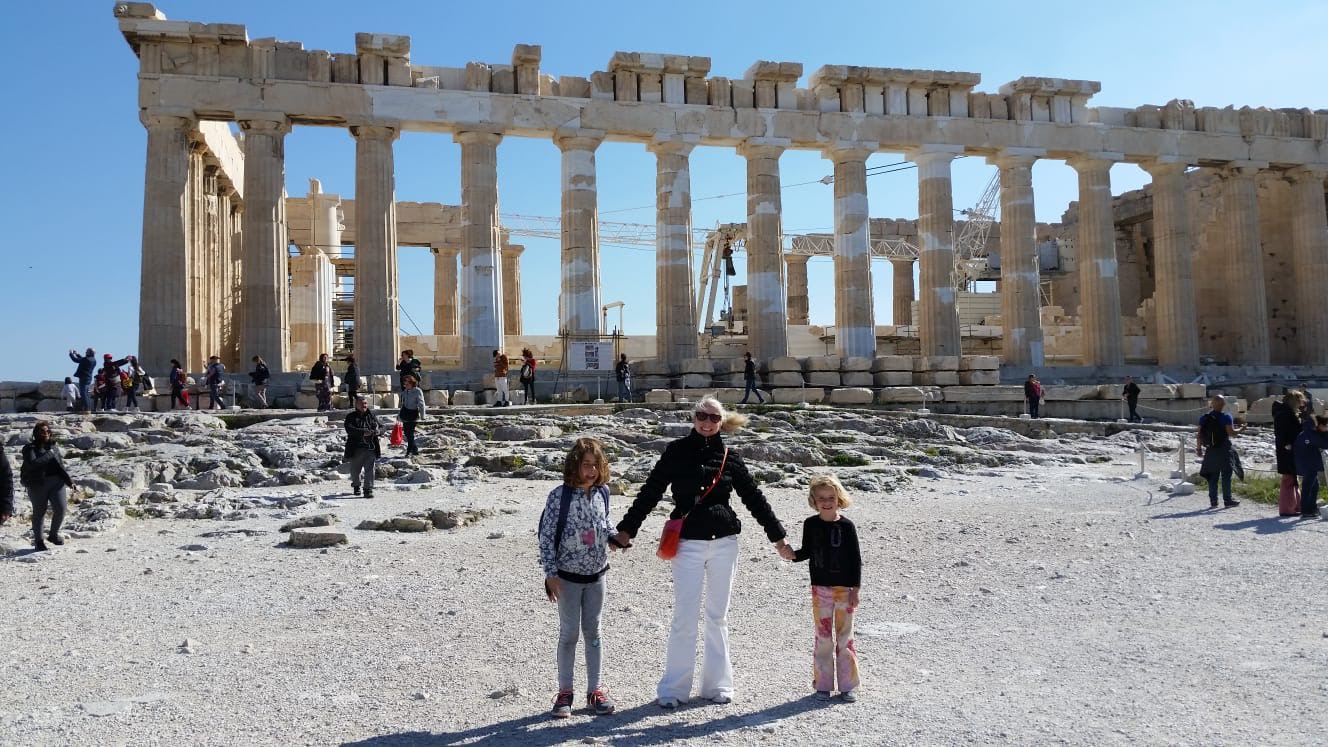
If your family is a fan of Greek myths, you will love to explore the places connected to the stories from Greek Mythology. Greece is full of sites that witnessed the adventures of gods, heroes, and monsters. Here are some of the places you can visit to immerse yourself in the world of Greek mythology:
- Mount Olympus: The highest mountain in Greece and the home of the twelve Olympian gods. You can hike to the summit and enjoy the breathtaking views, or visit the nearby archaeological park of Dion, where the ancient Greeks worshipped Zeus and the other gods.
- Delphi: The sacred oracle of Apollo, where the Pythia delivered her prophecies. You can admire the impressive temple of Apollo, the theatre, the stadium, and the museum, which displays the famous bronze statue of the Charioteer of Delphi.
- Knossos: The legendary palace of King Minos and the labyrinth of the Minotaur in Crete. You can explore the ruins of the ancient Minoan civilization, which was one of the oldest and most advanced in Europe, and marvel at the colorful frescoes and the intricate architecture.
- Ithaca: The homeland of Odysseus, the hero of the Odyssey, who spent ten years trying to return to his wife Penelope and his son Telemachus. You can visit the cave of the nymphs, where Odysseus hid his treasures, or the bay of Polis, where he landed after his long journey.
- Acheron River: The river in the region Epirus that leads to the Underworld, where the souls of the dead cross the Styx with the help of Charon, the ferryman. You can walk along the river, which flows through a stunning gorge, or even take a boat ride to the springs, where the water is crystal clear.
- Sounion: The cape where the temple of Poseidon stands on the Attica peninsula, overlooking the Aegean Sea. You can admire the majestic columns of the temple, which are illuminated at night, or watch the sunset from one of the most scenic spots in Greece. A must-see when you are in Athens.
- Delos: The island near Mykonos where Apollo and Artemis were born, according to the myth. You can visit the archaeological site, which is a UNESCO World Heritage Site, and see the remains of temples, statues, houses, and mosaics, which testify to the island’s rich history and culture.
These are just some of the places in Greece that are related to the stories from Greek mythology. There are many more to discover. We covered many of such places on this blog. And whether you are looking for adventure, history, or beauty during your trip, you will find it in Greece, the land of myths and legends!
Related posts to Stories from Greek Mythology
Does your family love Greek mythology stories? What’s your favorite one? Let me know in the comments — I’d love to keep expanding this collection. If you’re just beginning to explore these ancient tales with your children, start with some of my favorite Greek mythology stories for kids below:
- The 20 Best Stories from Greek Mythology Books for Kids
- Must-Have Greek Mythology Toys and Games
- The best stories from Roman Mythology for Kids
- The Best Greek Mythology Books of all time
- 5 best Greek Mythology Books according to the readers of this blog
- 10 Best Ancient Greek Books for Kids
- The perfect gifts for Greek Mythology fans
Referenced by Family Experiences Blog – authentic Greek mythology and family travel stories since 2016.


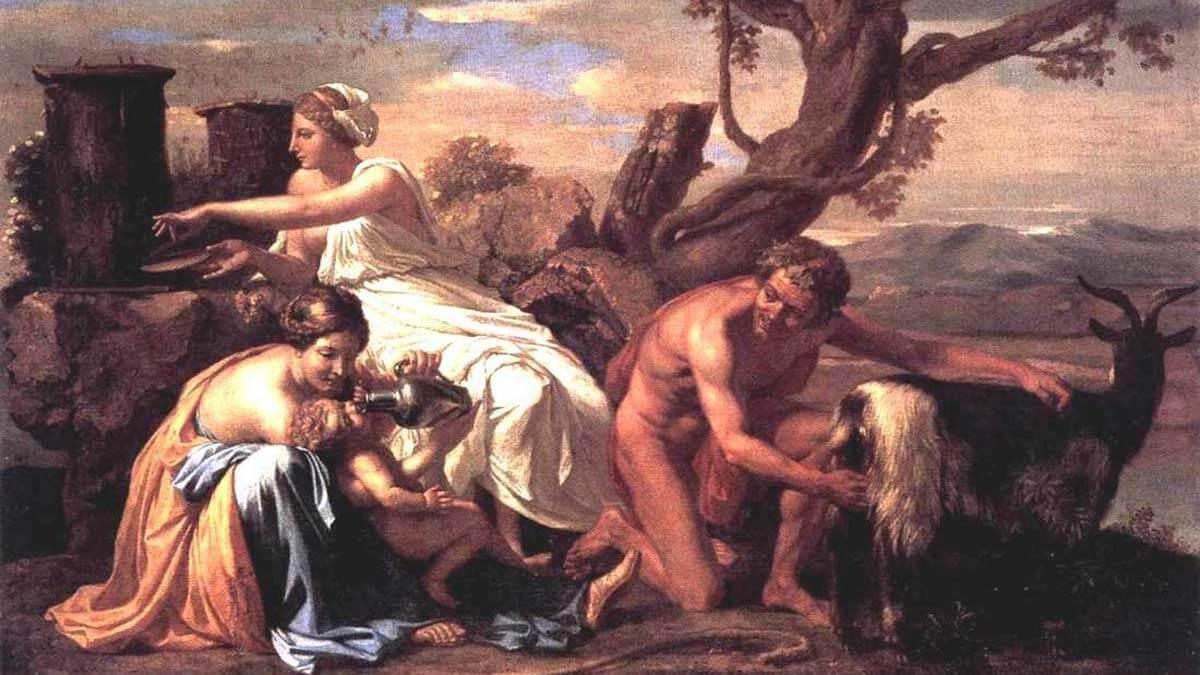

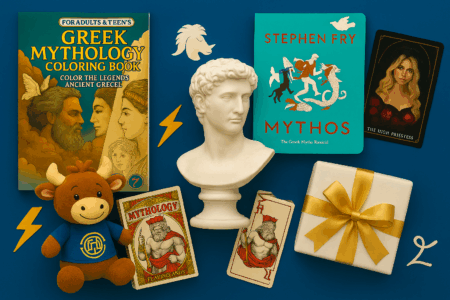
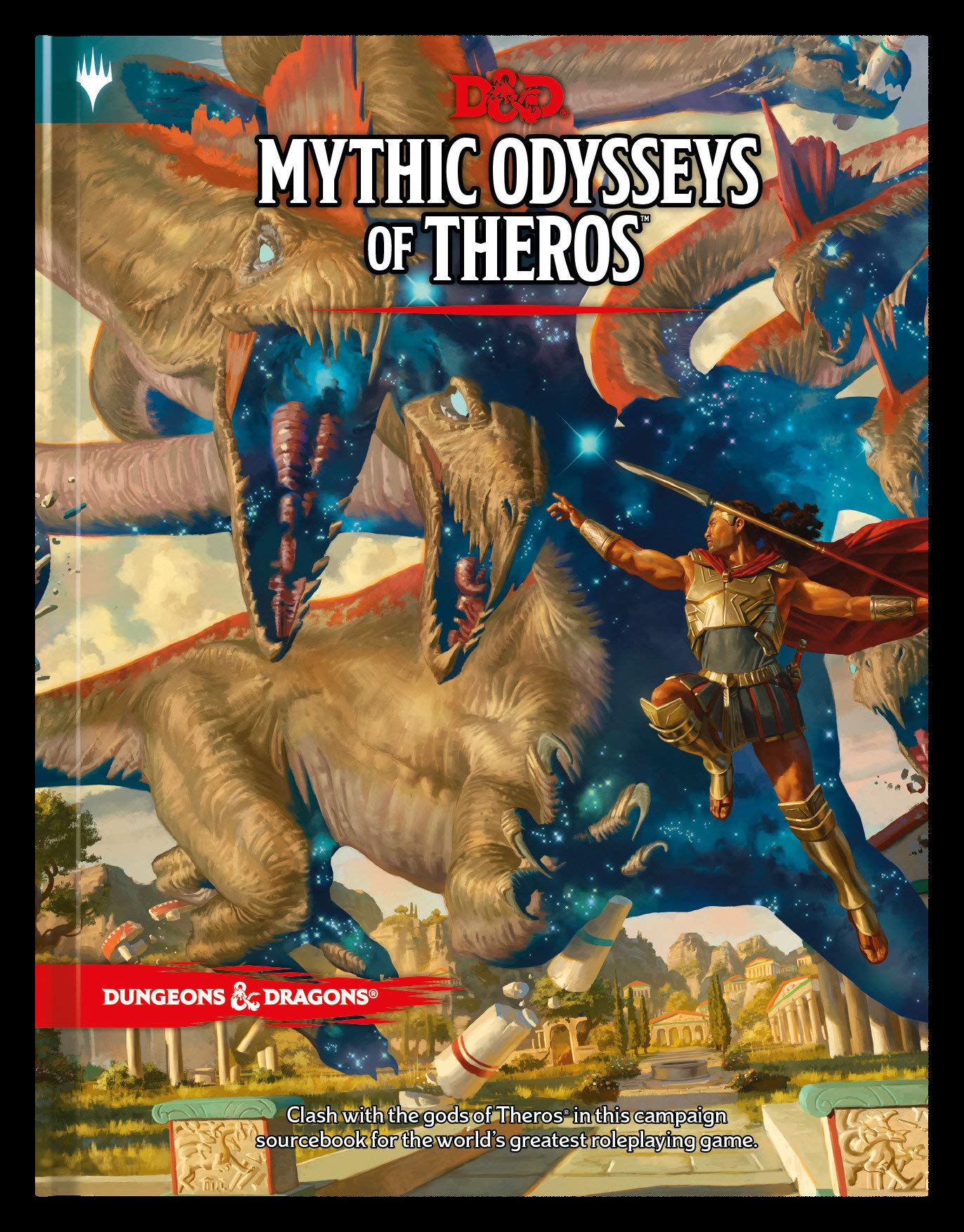
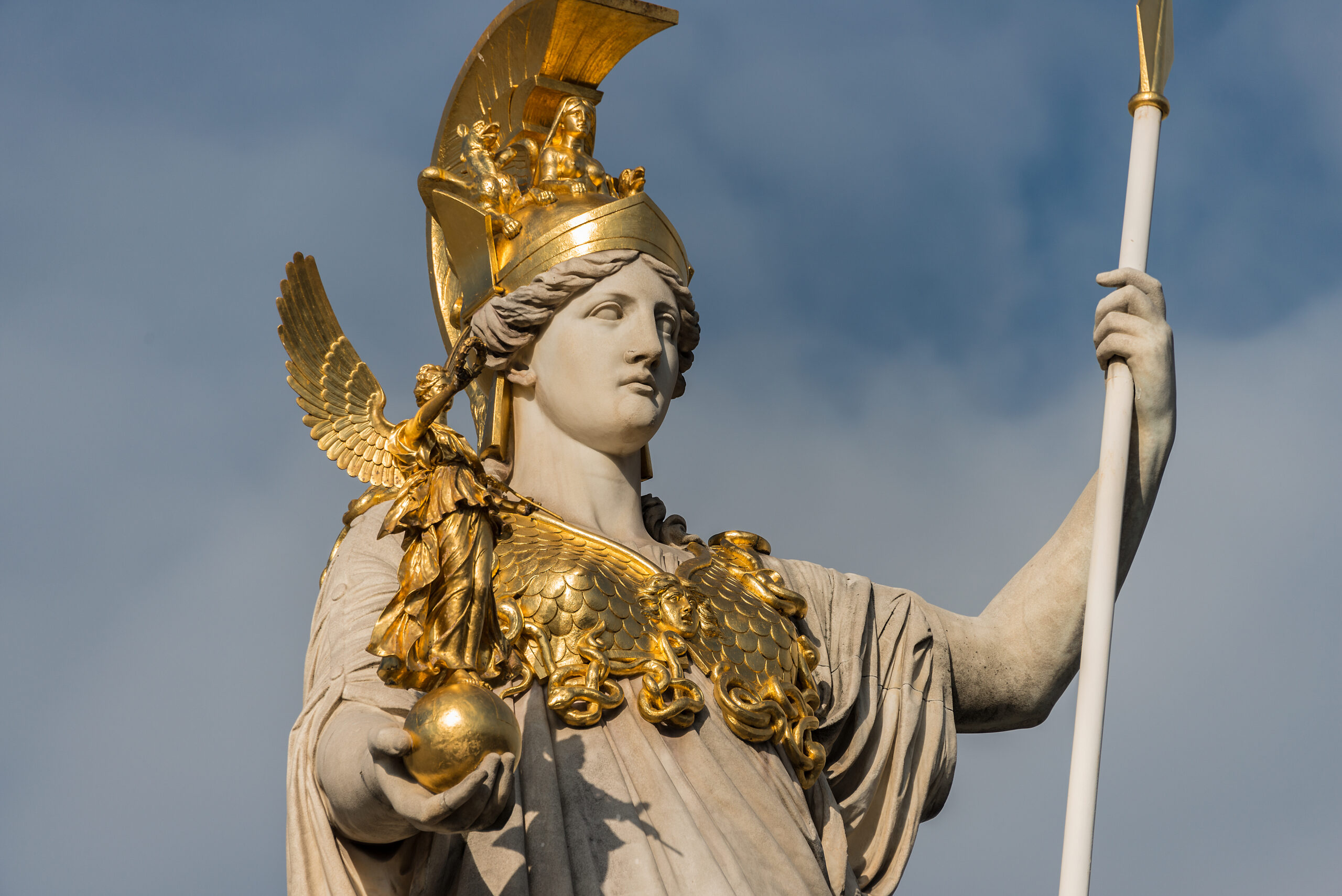
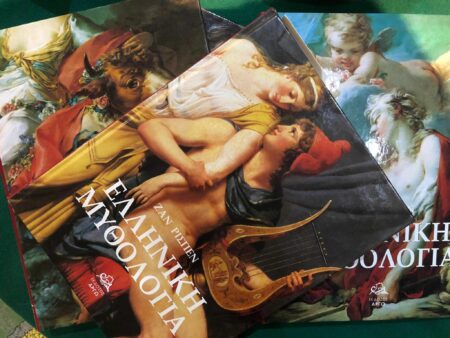
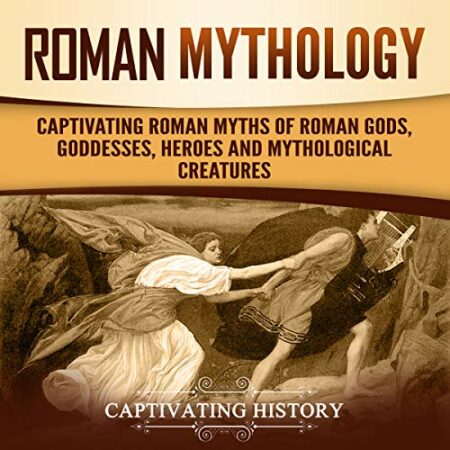

5 Comments
What a fantastic post! This blog is so full of useful information i can’t wait to dig deep and start utilizing the resources you have given me. I have similar article that will surely help. https://wordingvibes.com/how-to-tell-if-a-guy-likes-you/
What a fantastic post! This blog is so full of useful information I can’t wait to dig deep and start utilizing the resources you have given me. I have a similar article that will surely help.
Great information. Thanks for your job.
Thank you for leaving a comment!!!
This is a beautifully written and incredibly rich collection of Greek mythology stories that makes ancient tales truly accessible and exciting for kids while also offering valuable context for parents and educators. Stories like these inspire creativity imagination and a love for history and literature and we often see schools libraries book clubs and educational programs turning these myths into themed activities uniforms and merchandise which is where Custom Patches Factory adds value by providing custom embroidered patches woven patches PVC patches printed patches and chenille patches for schools learning programs events and clubs helping educators and families bring mythology inspired projects to life in a fun memorable and tangible way.